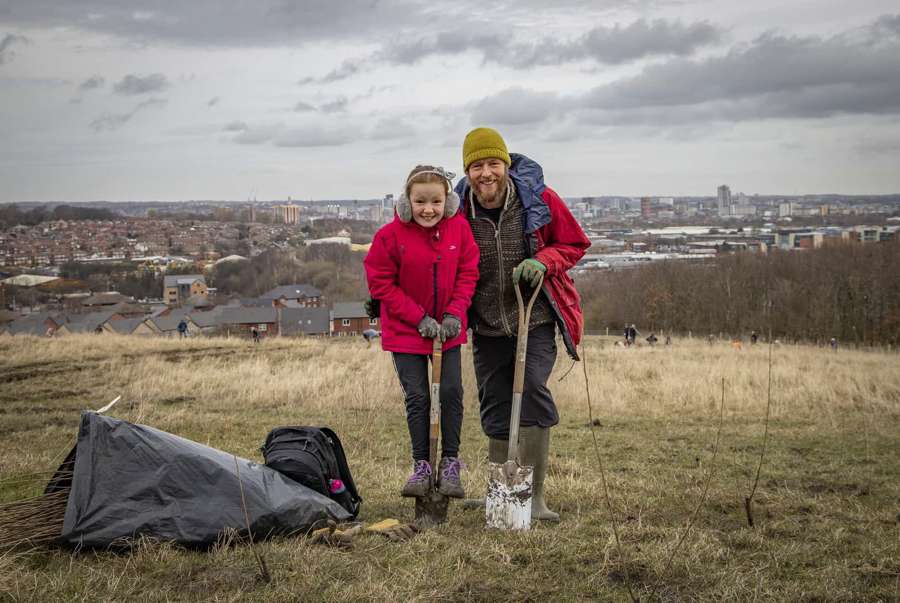The Government has awarded the White Rose Forest, the Community Forest for North and West Yorkshire, £3.7m to plant 218 hectares of trees (the equivalent of 400 football pitches) within the next planting season as part of the new Trees for Climate programme.
The White Rose Forest is one of ten community forests across England that will plant up to 500 hectares of trees over the next five months, to help deliver against the Government’s commitment to increase tree planting to 30,000 hectares per year in the UK by 2025. England’s Community Forests have secured an initial £12.1m of grant funding from the Government’s Nature for Climate fund for Trees for Climate.
In North and West Yorkshire, Trees for Climate funding will support substantial local tree planting programmes designed to improve the natural environment, reduce flood risk and combat climate change.
Close to Leeds City Centre, Leeds City Council, a member of the White Rose Forest partnership, will use some of the funding to help create a new woodland at Beeston Royds, a former land-fill site situated on a steep hillside. As well as capturing CO2 and improving biodiversity on the site, the new woodland will help prevent storm water flooding on the major motorway below. Beeston Royds woodland has also been supported to date by over 100 volunteers from local schools, universities and community groups, as well as national charity Trees for Cities.
Forest Minister, Lord Goldsmith, said:
“Through this exciting new programme, we will build back greener, as more communities – particularly those in urban environments – will have access to nature, with real benefits for health and wellbeing.” “Trees are the backbone of our urban and rural environments and essential in tackling the climate emergency. This vital programme will plant trees where they are most needed to stem flooding and provide more places for nature to thrive.”
Guy Thompson, Partnership Manager for the White Rose Forest, said:
“The White Rose Forest is working with local authorities, landowners, businesses and communities across North and West Yorkshire to plant woodland and improve our natural environment.” “The Government’s Trees for Climate funding will make a big difference to our ambitious plans for tree planting over the year ahead as well as the support we can offer landowners to plant and maintain new woodland. We would be delighted to hear from any landowner who would like to get involved.” “This funding is important recognition for the White Rose Forest, community forestry and the role of trees in tackling the effects of climate change across North and West Yorkshire.”
Cllr Lisa Mulherin, Leeds City Council’s Executive Member for Climate Change, said:
“Tree planting at Beeston Royds will play a vital role in supporting local wildlife, reducing flood risk and tackling the climate emergency in Leeds.” “It has been inspiring to see so many volunteers of all ages getting involved in the project and showing a real passion for the environment and their local community.” “This is one of many sites that will contribute towards the White Rose Forest in Leeds and help to meet the Council’s ambition to double the city’s tree canopy cover in line with our carbon reduction commitments. These trees will have a huge benefit to the health and wellbeing of our city, now and in years to come.”
Trees for Climate will help deliver against the goals in the Government’s 25 Year Environment Plan and support Nature Recovery Networks across England. It is being supported by The Community Forest Trust, the national charity for community forestry, and is being delivered through Cheshire West and Chester Council, the accountable body for the programme.
As well as funding the tree planting activity itself, the grant will help each of the Community Forests to manage all aspects of the new woodland creation, including engagement with communities and landowners. The funding will also help develop new approaches to long term woodland management, improve sustainability, and find innovative new models of woodland delivery that may help shape the future of community forestry.
The new woodlands will store vast quantities of carbon and play an important role in the Government’s commitment to achieve net zero carbon emissions in the UK by 2050. The woods will also deliver natural flood management systems, improve air quality and create a more advantageous setting for economic recovery and growth. Through Trees for Climate more communities in towns and cities will get access to nature and the health and wellbeing benefits this provides.
